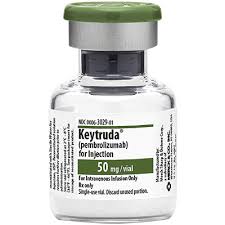Liquid Biopsy Continues to Show Value; Keytruda Continues to Show Benefit in New Indications

ASCO included presentations from several companies showing how liquid biopsy and comprehensive genotyping can be central to precision oncology strategies in advanced cancer. Since the introduction of liquid biopsy, growing evidence has supported the similarity of results obtained via blood-based analyses and invasive tissue biopsies. Besides making it easier to detect clinically actionable mutations that can guide precision treatment choices, liquid biopsies make serial testing feasible, to potentially reveal how a patient’s tumor is evolving over time or to spot early indications that resistance to a therapy is developing. Guardant Health and Foundation Medicine were among the companies presenting new data on such predictive uses of the technology.
Guardant Health presented studies using its Guardant360 liquid biopsy test showing that its technology could enable researchers to predict which patients would respond to ALK inhibitors, including Pfizer’s Xalkori and Roche’s Alecensa, and which would develop resistance. They showed that the absence of detectable cell-free tumor DNA (cfDNA) at baseline, before starting ALK-targeted treatment, or the disappearance of cfDNA two months after treatment correlates with better patient outcomes, including both longer progression-free survival (PFS) and overall survival (OS). Conversely, the presence of co-occurring TP53 gene alterations and ALK fusions was associated with the development of resistance and worse patient outcomes.
Foundation Medicine and its collaborators presented multiple studies that showcased the unique value of comprehensive genomic profiling via liquid biopsy for investigating pan-tumor molecular signatures like tumor mutational burden and micro-satellite instability, and then using that information to advise precision treatment and to follow a cancer’s evolution over time. They further showed that liquid biopsy could be used to track potential acquired resistance to treatment and to predict patient response to specific immunotherapy.
New Keytruda Benefit Highlighted in Variety of Indications
New data presented at ASCO from multiple Keytruda trials, both single-agent and combination studies, has continued to show strong benefit for Merck’s PD-L1 inhibitor in a variety of cancer indications.

In a late-breaking presentation from a 300-patient Phase 3 study in colon cancer, single agent Keytruda doubled the time to disease progression compared to chemotherapy in patients with tumors marked by microsatellite instability high (MSI-H) or mismatch repair deficient (dMMR) mutations, achieving 16.5 months versus 8.2 months. The Keytruda-treated patients also experienced fewer side effects compared to chemotherapy, about 22% for the Merck drug versus 66% in the chemotherapy arm of the trial. The FDA approved Keytruda for cancers with MSI-H and dMMR mutations on a tumor-agnostic basis three years ago in patients with advanced cancers no longer responsive to previous treatment. However, this is the first data to show a substantial benefit in previously untreated patients. Roughly 10% of all colon cancer patients have tumors with MSI-H and dMMR mutations, and such patients typically have a worse prognosis. On June 17, the FDA awarded Keytruda its second approval for a tumor-agnostic indication, patients with high tumor mutational burden (tumors with at least 10 mutations per megabase or greater) who have progressed despite prior treatment and have no satisfactory alternative treatment options.
In metastatic triple-negative breast cancer, Merck presented data showing that Keytruda plus chemotherapy reduced the risk of disease progression or death by 35% compared to chemotherapy alone in patients with high levels of PD-L1. Keytruda-treated patients went a median of 9.7 months without their disease worsening, compared to 5.6 months for those receiving chemotherapy alone. Roche’s Tecentriq was approved in March for first-line use with abraxane in metastatic triple-negative breast cancer, making it the only approved PD-L1 inhibitor for that indication. Keytruda can be used with a wider range of chemotherapy options but is likely still two years from approval.
Keytruda also showed promising results when paired with Lenvima, the kinase inhibitor that Merck shares with Eisai, in the treatment of liver and kidney cancers. Roche received FDA approval on June 2 for the combination of Tecentriq plus Avastin in first line treatment of liver cancer, where the combination produced a 27% response rate. At ASCO, Merck presented results from a Phase1b, 100-patient study of Keytruda plus Lenvima that achieved an overall response rate of 36% and a median duration of response of 12.6 months. A pivotal study of the Keytruda-Lenvima combination in liver cancer is ongoing, with results expected in 2022. The FDA granted breakthrough therapy designation to the combination in liver cancer in July 2019.
Results from a Phase 1b/2 study of the Keytruda-Lenvima combination additionally showed benefit in 100 patients with metastatic clear cell renal cancer who had failed previous checkpoint inhibitor therapy. At a data cut-off of 24 weeks, ORR was approximately 52% and stable disease achieved by 36% of treated patients. Median PFS was between 11-12 months, and median duration of response 11.7 – 12.6 months (depending on investigator assessment used).
In non-small cell lung cancer (NSCLC), Merck presented initial positive results from a Phase 2 study of Keytruda plus chemoradiation therapy in previously untreated patients with unresectable advanced stage III disease. In this study, a cohort of patients with squamous and nonsquamous NSCLC who received Keytruda plus paclitaxel and carboplatin achieved an ORR of 67%, while a cohort of patients with nonsquamous NSCLC patients who received Keytruda plus cisplatin and pemetrexed achieved an ORR of 56.6%.
Finally, new data from the pivotal Phase 3 KEYNOTE-189 trial in metastatic NSCLC, showed that 45.7% of patients treated with the combination of Keytruda plus chemotherapy were alive at two years versus 27.3% of patients treated with chemotherapy alone. The principal investigator for this trial commented that these final results support the use of Keytruda plus chemotherapy as a standard of care for this disease.
Merck and its collaborators are continuing to study Keytruda in over 1,200 clinical trials covering a variety of tumor types and treatment settings, to thoroughly understand its potential across different cancers, both alone and in combination, and against different biomarker targets.